
Food Science of Animal Resources
metrics 2024
Leading the Charge in Animal Resources and Food Safety Research
Introduction
Food Science of Animal Resources is a prestigious, peer-reviewed journal published by the Korean Society of Food Science and Animal Resources, serving as a vital platform for disseminating advanced research in the fields of Animal Science and Food Science. Since its inception in 2018, the journal has quickly established itself with an impressive Q1 ranking in both categories for 2023, indicating its relevance and influence in the academic community—evident by its ranking of #23 in Animal Science and Zoology and #78 in Food Science among thousands of journals. Operating on an Open Access model since 2019, it enables unrestricted access to cutting-edge research for a global audience, facilitating collaboration and innovation. Its commitment to quality and rigor makes it an essential resource for researchers, professionals, and students dedicated to advancing knowledge in food safety, nutrition, and sustainable practices within the animal resource sector. Set against the vibrant backdrop of South Korea, the journal aims to bridge gaps in knowledge and foster communication among scholars and practitioners worldwide.
Metrics 2024
 0.69
0.69 4.20
4.20 3.70
3.70 43
43Metrics History
Rank 2024
Scopus
IF (Web Of Science)
JCI (Web Of Science)
Quartile History
Similar Journals
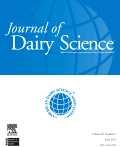
JOURNAL OF DAIRY SCIENCE
Innovating the Future of Dairy with Scholarly InsightsThe JOURNAL OF DAIRY SCIENCE, published by Elsevier Science Inc., stands as a premier outlet for scholarly research in the fields of Animal Science, Food Science, and Genetics. With an impressive legacy dating back to 1917, this esteemed journal continues to contribute significantly to the advancement of dairy science and related disciplines, boasting a remarkable Q1 status across its categories as of 2023. In the realm of Agricultural and Biological Sciences, it ranks 15th out of 490 in Animal Science and Zoology, indicating a strong influence and recognition in the field. Researchers and professionals worldwide rely on this journal for the latest findings, innovative techniques, and comprehensive reviews, making it an essential resource for advancing knowledge and practices within the dairy sector. While the journal maintains a subscription-based access model, its rich content remains unparalleled in guiding future research and fostering collaborative advancements. Its enduring commitment to quality sets a high standard for publication, reinforcing its invaluable position in the scientific community.
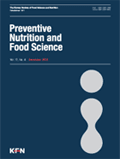
Preventive Nutrition and Food Science
Transforming Dietary Insights into Preventive StrategiesPreventive Nutrition and Food Science, an esteemed journal published by the Korean Society of Food Science and Nutrition, serves as a pivotal platform for the dissemination of innovative research and insights in the fields of food science, nutrition, and dietetics. With an ISSN of 2287-1098 and an E-ISSN of 2287-8602, this journal is dedicated to advancing knowledge from 2012 through 2024, showcasing contributions that reflect the interplay between nutrition, health, and preventive strategies. Indexed in Scopus, it proudly holds a Q2 ranking in Food Science and a Q3 ranking in Nutrition and Dietetics as of 2023, positioning it among influential publications within these disciplines. Researchers, professionals, and students can explore cutting-edge studies that contribute significantly to evidence-based practices, enhancing public health and nutritional care. Although it operates under a subscription model, the journal plays a crucial role in fostering a deeper understanding of preventive nutrition, advocating for advancements that address contemporary dietary challenges.

Acta Scientiarum Polonorum-Technologia Alimentaria
Pioneering Insights in Food Safety and QualityActa Scientiarum Polonorum-Technologia Alimentaria, published by Poznan University of Life Sciences, is a revered journal in the field of food science, showcasing cutting-edge research and innovations in food technology. Established as a leading platform within its domain, this journal is indexed under Scopus and ranks in the 2023 Q3 quartile for Food Science, demonstrating its commitment to high-quality scholarship. With an ISSN of 1644-0730 and E-ISSN 1898-9594, it serves as a critical resource for researchers, professionals, and students seeking to stay at the forefront of advancements in food safety, quality control, and sustainable practices. The journal has also been recognized for its contributions to the agricultural and biological sciences, positioning itself at rank #205 out of 389 in this competitive field. While currently not offering open access, the journal's valuable insights and findings, especially as it publishes through 2024, play a crucial role in advancing knowledge and fostering collaboration among experts in the food science sector.
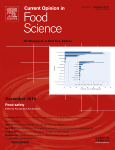
Current Opinion in Food Science
Leading the Conversation in Food InnovationCurrent Opinion in Food Science is a premier peer-reviewed journal published by ELSEVIER SCI LTD that focuses on the latest advancements and research in the domain of food science and technology. With its ISSN 2214-7993 and E-ISSN 2214-8000, this journal serves as a critical platform for researchers and professionals to share insights and opinions on emerging trends, innovations, and challenges faced in food science. The journal enjoys an impressive impact factor and ranks in the first quartile (Q1) in both Applied Microbiology and Biotechnology and Food Science, symbolizing its influence and reputation in the field. It is strategically located in the Netherlands and conducts its academic dialogue with a broad scope that includes essential topics in food safety, nutrition, and sustainable practices. Operating from 2015 to 2024, the journal has established itself as a critical resource for the global academic community, boasting excellent Scopus rankings—#9 out of 389 in Food Science and #6 out of 127 in Applied Microbiology and Biotechnology—indicating its high relevance and impact. Readers can look forward to insightful articles and comprehensive reviews that bridge the gap between fundamental research and practical application in the ever-evolving food science landscape.

CZECH JOURNAL OF FOOD SCIENCES
Exploring Innovative Solutions for Food Safety and TechnologyCzech Journal of Food Sciences is a premier publication in the field of food science, disseminating vital research since its inception in 1999 and transitioning to Open Access in 2007. Published by the Czech Academy Agricultural Sciences, this journal facilitates the exchange of knowledge among researchers, professionals, and students dedicated to advancing the understanding of food systems, safety, and technology. With an ISSN of 1212-1800 and an E-ISSN of 1805-9317, it holds a respectable position with a Q3 ranking in the Food Science category for 2023, illustrating its commitment to high-quality research despite its Scopus rank of 209 out of 389, situated in the 46th percentile. Located in the heart of the Czech Republic, at TESNOV 17, PRAGUE 117 05, this journal serves as an essential resource for those involved in agricultural and biological sciences, paving the way for innovative discoveries and applications in food science.
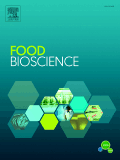
Food Bioscience
Innovating Solutions for a Sustainable Food FutureFood Bioscience is a leading peer-reviewed journal published by Elsevier, dedicated to advancing the understanding of the complex interplay between food science and biosciences. With an impressive Impact Factor that places it in the Q1 and Q2 quartiles for Food Science and Biochemistry respectively, the journal consistently ranks among the top publications in its field, reflected in its Scopus rankings (Rank #83/389 in Food Science and Rank #175/438 in Biochemistry). Since its inception in 2013, Food Bioscience has fostered a multidisciplinary approach, bridging gaps between research in agricultural, biological, and food sciences, thus encouraging innovative solutions to the pressing challenges facing the global food supply chain. Although it currently operates under a subscription model, the journal is committed to disseminating high-quality research, making significant contributions to both academic scholarship and industry practices. Researchers, professionals, and students alike are invited to explore the wealth of knowledge contained within its pages as it plays a pivotal role in shaping the future of food bioscience.
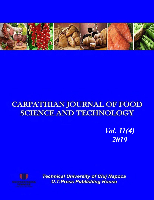
Carpathian Journal of Food Science and Technology
Exploring Culinary Frontiers Through ResearchCarpathian Journal of Food Science and Technology, a distinguished publication from the NORTH UNIV CENTER BAIA MARE, has been a pivotal platform for disseminating groundbreaking research in the field of food science since its inception in 2009. With an ISSN of 2066-6845 and an E-ISSN of 2344-5459, this Open Access journal aims to promote knowledge and innovation, offering unrestricted access to its content, thereby enhancing visibility for authors and facilitating a wider readership. Based in Romania, the journal plays a crucial role in advancing scientific inquiry within the agricultural and biological sciences, particularly focusing on contemporary food science issues. As it continues its convergence through 2024, the journal currently holds a Q4 ranking in the Food Science category, allowing it to carve out a unique niche within the academic community despite its current Scopus percentile ranking of 19th. Scholars, researchers, and students in the field will find the journal an invaluable resource for the latest advancements and discussions, making it an essential addition to their academic pursuits.

Journal of Food Science and Technology-Ukraine
Enhancing Nutritional Quality Through Cutting-Edge ResearchJournal of Food Science and Technology-Ukraine, published by the Odesa National University of Technology, stands as a pivotal platform dedicated to the dissemination of high-quality research in the field of food science and technology. With its open access policy established in 2014, the journal fosters global knowledge sharing and accessibility, enabling researchers, professionals, and students to access critical findings and advancements in food technology without barriers. The journal's commitment to publishing innovative studies, reviews, and case analyses reinforces its role in addressing contemporary challenges in food safety, preservation, processing, and nutritional quality. With ISSN 2073-8684 and E-ISSN 2409-7004, it serves as a valuable resource for the academic community, supporting the advancement of food science knowledge and its practical applications.
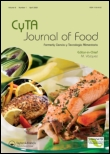
CyTA-Journal of Food
Transforming the food landscape with impactful research.CyTA-Journal of Food is a prestigious academic journal published by TAYLOR & FRANCIS LTD, dedicated to advancing the field of food science and technology through the dissemination of innovative research and practical knowledge. With an ISSN of 1947-6337 and an E-ISSN of 1947-6345, this journal stands out with its strong impact factor and is currently placed in the Q2 quartile across multiple categories, including Chemical Engineering, Chemistry, and Food Science, making it a vital resource for researchers and professionals alike. The journal has been an integral part of the academic community since its inception in 2009, and continues to publish cutting-edge articles through to 2024. Its alignment with Scopus ranks further signifies its influence, notably achieving 67th percentile in Industrial and Manufacturing Engineering. As an Open Access journal, it ensures widespread accessibility to its valuable content, promoting collaboration and knowledge sharing among scientists, engineers, and students dedicated to enhancing food safety, quality, and sustainability.

Current Research in Food Science
Leading the Charge in Food Science AdvancementsCurrent Research in Food Science is a leading peer-reviewed academic journal published by Elsevier, specializing in the dynamic field of food science. Since its transition to an Open Access model in 2019, the journal has broadened its reach, contributing significantly to the dissemination of high-quality research. With strong rankings, including a Q1 quartile status in Applied Microbiology and Biotechnology, Biotechnology, and Food Science, it stands out as a pivotal resource for scholars. Based in the Netherlands, current research published within its pages spans a wide range of relevant topics, ensuring that researchers and practitioners stay abreast of the latest advancements. The journal's impressive Scopus rankings enhance its credibility, with a percentile standing in the 74th to 83rd range across relevant categories, underscoring its impact and importance in the academic community. Current Research in Food Science aims to foster the exchange of innovative ideas and foster collaborative efforts among researchers, making it an essential resource for those engaged in advancing the science and technology of food.